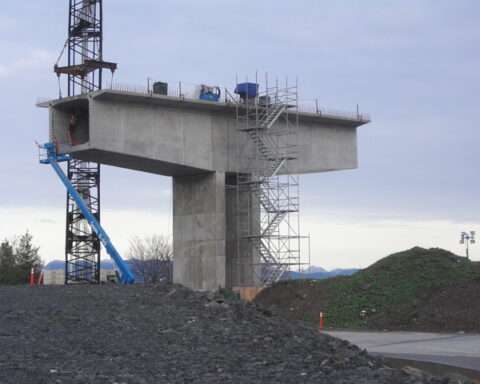Citing a need to protect against public safety and security risks brought on by the disruption of goods and services, the federal government on Monday announced a host of new initiatives aimed at protecting the nation’s supply chain.
The White House at its inaugural meeting of the Supply Chain Resilience Council announced more than 30 new actions aimed at strengthening supply chains and lowering costs for consumers.
Those actions include partnerships such as the Supply Chain Resilience Center, a new government entity designed to collaborate with the private sector to anticipate and mitigate disruptions that reached a crescendo during the COVID-19 pandemic.
“The global pandemic has revealed that the supply chains that Americans rely upon for food and essential other goods must be more robust and resilient,” Secretary of Homeland Security Alejando N. Mayorkas said. “Conflict, political instability, and climate change could challenge our supply chains in the years ahead.”
The center’s tasks include integrating industry expertise and data analytics to develop innovative supply chain risk-assessment tools and coordinating deep-dive analyses on select critical supply chains to drive targeted actions to increase resilience.
The center aims to build broad partnerships across government, industry and academia, including collaborating with the Department of Energy (DOE) to conduct analyses on clean energy supply. The Department of Commerce is also partnering with Health and Human Services to address foreign dependency vulnerabilities and points of failure for critical drugs.
The new SCRC’s duties also include addressing port security vulnerabilities, updating port security advisories, reducing risks related to cybersecurity weakness, coordinating with the Department of Commerce on securing the semiconductor supply chain and hosting two tabletop exercises in 2024 to test supply chain resiliency.
Announcements also included the launch of the Office of Multimodal Freight Infrastructure and Policy, or Multimodal Freight Office, to oversee the nation’s freight network and supply chains. The new office will advance the cost-cutting efforts of the Department of Transportation’s (DOT) Freight Logistics Optimization Works Program (FLOW), a public-private partnership that includes the five largest U.S. container ports and four of the five largest retailers.
The new office will oversee the development of the National Multimodal Freight Network, review state freight plans and provide technical assistance to state and local governments.
Program participants are beginning to utilize FLOW data to inform their logistics decision making, the USDoT said. The data is helping to avoid bottlenecks, shorten lead times for customers and enable a more resilient and globally competitive freight network through earlier warnings of supply chain disruption.
The DoT will also work with the Department of Agriculture (USDA) to increase data transparency for containerized shipments of agricultural products in the United States, efforts that can help producers and sellers avoid disruptions that can increase food prices.
Other actions announced Monday include:
- Using the Defense Production Act to make more essential medicine in the United States to mitigate drug shortages.
- Awarding $275 million in grants through the DOE’s Advanced Energy Manufacturing and Recycling Grant program, which is aimed at investing in clean energy supply chains and revitalizing communities affected by coal mine or power plant closures.
- Investments by the USDA totaling $196 million to strengthen domestic food supply chains by creating more opportunity for farmers and entrepreneurs in 37 states and in Puerto Rico in diversified food processing, resilient agricultural markets, and fertilizer production. Lone Star Bakery tops that investment list, securing a $40 million Food Supply Chain Guaranteed Loan to modernize two facilities to meet the needs of current and future customers.
- The first ever National Defense Industrial Strategy (NDIS) published by the Department of Defense (DoD). The NDIS will guide engagement, policy development and investment in the defense industrial base over the next three to five years by focusing on the multiple layers of suppliers and sub-suppliers that make up critical supply chains.
All news and information on this site is provided by the team at Strategic Partnerships, Inc. Check out this short 1-minute video that provides a quick overview of how we work with clients.












